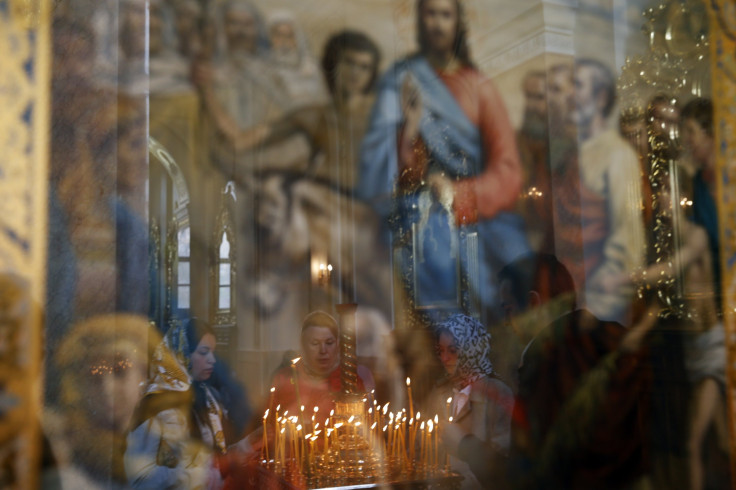Pascha Orthodox Easter 2015: 3 Things To Know About The Eastern Christian Celebration

Orthodox Christian churches from Russia to Egypt are preparing to celebrate Easter, also known as Pascha to many Eastern Christians, this Sunday. The celebration, which comes one week after most Christians around the world marked the holiday on April 5, similarly commemorates the resurrection of Jesus and shares fundamental similarities with the Western Christian celebration. However, there are also notable differences between the two celebrations, from when they are observed to what they are called.
Easter vs. Pascha
While some English-speaking Orthodox Christians may refer to the holiday as Easter, many do not, opting instead for the traditional name Pascha. It is no coincidence that Pascha, the transliteration of the Greek word for Easter, sounds like the Hebrew word for Passover, "Pesach"; the former is actually derived from the latter, both etymologically and historically. The Jewish holiday of Passover is the “prototype” for Pascha, said the Rev. Alciviadis C. Calivas.
“The first Christians were Jews and obviously conscious of the Jewish festal calendar,” Calivas wrote in a commentary for the Greek Orthodox Archdiocese of America. “It would be hard to imagine that the Christians of the first century would not have projected and connected in some new and significant way their weekly celebration of the sacred events of Christ's death and resurrection on the annual observance of the Passover.”
Maintaining this connection to Christianity’s historic roots is important for many Eastern Orthodox Christians who choose not to refer to the holiday as Easter because of that word’s historical pagan links. The Anglo-Saxon word gets its name from the Teutonic goddess Eostre, who also gives her name to the pagan spring equinox festival Ostara.
“[Easter] has no associations whatsoever with Christ, His death and Resurrection, or indeed anything Christian,” wrote Father Michael Harper for the Orthodox Research Institute. “Is it not, therefore, unsuitable to be used to describe the greatest day in the life of the Church?”
Calendar Difference
Western and Eastern Orthodox Easter celebrations do, on occasion, coincide. However, the two often do not fall on the same Sunday and can be anywhere from a week to five weeks apart from each other. The two traditions base their calculations for the date of Easter on the same formula but use different calendars, resulting in the discrepancy between the two observations. The older Julian calendar used by Eastern Orthodox churches trails the Gregorian calendar by several days. As a result, Western Easter can fall anywhere from March 22 to April 25, while Pascha can fall anywhere from April 4 to May 8.
Traditions
Eggs are a major motif in both celebrations, and a common Orthodox custom is to dye the eggs a deep red color to represent the life and blood of Jesus. These dyed eggs are also sometimes incorporated into Pascha celebrations like the traditional Greek Easter game “tsougrisma,” which involves opposing players attempting to crack each other’s eggs.
Large family feasts are also a staple of Pascha celebrations, which mark the end of the 40-day Lent fast during which meat and dairy-based foods are restricted. A cheesecake known as Pascha is a traditional breakfast food for the holiday and is commonly consumed in households in Eastern European countries like Russia, Ukraine and Poland. In many countries, it is also traditional to bring baskets of food to church to be blessed.
© Copyright IBTimes 2024. All rights reserved.






















